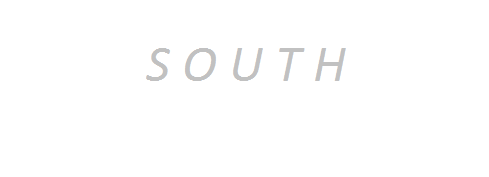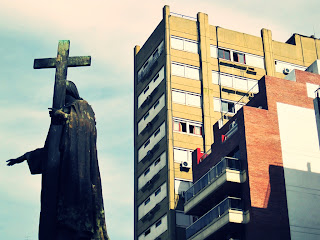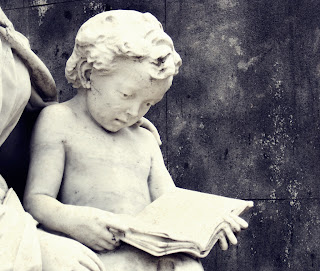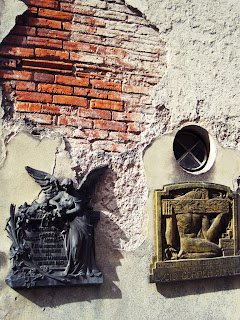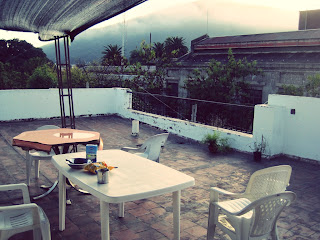It was tree-less, grey-green thornscrub for as far as you could see.
There was no shade and the wind was relentless. The gusts blew my bike
out into the road. I had ridden all day in my lowest gear. In 12 hours, I
had covered 80 kilometers.
I passed a shrine to Gauchito Gil and then a sign for “Agro Tourism,”
and I turned off onto a one-track dirt road that led back to an estancia. In front of a white farmhouse shielded by poplars a man sat at a table drinking mate. I had not seen anyone in three days.
“¿Qué tal?”
“The wind is strong. The wind has defeated me today,” I said.
“This wind is nothing,” said the man. “In the Land of Fire is the strong wind. La Escoba de Dios. The Broom of God, they call it.”
His name was Guido and I asked about food and water and a place to
put up my tent. Did I also want to go horseback-riding, or to fish at
the coast? Did I want to hunt guanaco? I told him I was too fatigued for
those activities and we came to an agreement that for 100 pesos I would
put up my tent and have an asado of mutton for dinner, then breakfast in the morning.
Guido showed me a place along the poplars to put the tent, and as I
started to put it up, he whistled and called for “Samantha.” A guanaco
came trotting out from the corral. Two sheepdogs barked and nipped at
her legs. I had only seen guanaco from a distance on the pampas.
They were like deer with bulging black eyes. As the guanaco neared,
Guido quickly turned his back to it. The guanaco sniffed at his hair and
his neck, and then it rubbed its nose on his back.
"You must not look at the eyes of Samantha," Guido warned me. “If you look at the eyes, she will [something] on you.”
I looked away. But I did not understand the verb. I asked Guido to repeat it, but I still didn’t understand.
Guido tried in English, “You look at the eyes, she put a spell on you.”
“A spell?”
“A spell. Yes.”
Whether or not I respected the dark power of certain animals to cast
spells, I saw the seriousness with which Guido turned his back to the
creature, and so when she came for me I quickly turned away. I felt her
at my back and then her breathing upon my neck. I reached behind and
touched her fur. I wanted to be friendly. I didn’t want her practicing
any witchcraft upon me. She pulled out a mouthful of hair from the back
of my head and I jumped forward.
Guido laughed. “Cuidate. If she [something] on you, it will take four baths to remove the smell. The saliva is dark and very terrible.”
I realized Guido had been trying to say that Samantha would spit at
you if looked directly in the eyes. There was no sorcery involved. He
had confused the English words “spell” and “spit.”
I went back to putting up the tent, but Samantha continued to harass
me. Being unable to turn and face her, she would trot up behind me and
pluck out my hair. It was all very funny for Guido.
When the tent was up, we went behind the farmhouse where the peon was butchering a sheep for the asado.
He stretched the carcass on an iron spit and staked it above the fire. A
dog chewed on a purpled bunch of intestines in the dust. Guido and I
drank cups of rainwater from a barrel.
"Do you not fear camping?"
“What is to fear?”
“Do you not fear the Mapuche?”
“What is the Mapuche?”
“Indígenas. They come with a knife in the night. Chorros. Thieves. I do not hire Mapuche. No one hires Mapuche.” He nodded at the peon. “That one is Tehuelche. Only a half-breed.”
Inside the farmhouse, we sat at the dinner table drinking Fernet and
cola. It was dark outside and the generator hummed loudly. Samantha
looked in through the farmhouse window, her nostrils pressed against the
glass. “She looks for you,” said Guido. I thought so too. His wife
brought out the heaping plates of mutton-chops with mashed potatoes and a
salad of greens and tomatoes. The meat was delicious.
“Do you think more gringos will come here?” Guido asked.
“Maybe. But it is far.”
“In Patagonia everything is far. But there are penguins here.”
"There are penguins in other places too."
The lights flickered and went out. The generator had stopped. It was
quiet and his wife lit the candles and we finished eating by
candlelight.
“If only they brought us electricity. If only the government brought us running water and telephone lines. More gringos would come then.”
“Maybe.”
“She destroys Argentina, this Kirchner. This one destroys it worse than the husband. Esos chorros roban Patagonia. These thieves steal from Patagonia.”
His wife touched his arm.
“They argue always for who has the true Peronismo. But all are chorros. Thieves. What they do not steal for themselves, they give to the poor. That is the true Peronismo.”
"He is a little drunk."
“And what if I am drunk? Are they not chorros? Do they not steal from Patagonia?”
“Yes, Guido,” she said gently.
“These thieves steal from Patagonia because it is where there is
money. But soon they take all the money. Soon there is no more money!”
Guido slammed his fist on the table, his glass bouncing off and
shattering on the floor. “Putos chorros!” He looked as though about to cry. He stood from the table and left the room. His wife picked up the pieces of broken glass.
“I am tired,” I said finally.
“Yes,” she said. “The wind was strong today.”
I did not see Samantha at the window. I went to the door and opened
it carefully and started towards the tent. Then I heard the guanaco
behind me in the darkness and I ran. I heard her stumble on something
and I quickly unzipped the rain-fly and crawled inside. I heard her outside. She was nibbling on the tent poles.
In the morning, I packed up and loaded the bike. Guido prepared mate
for us and apologized for the night before. After all, it has happened
before, he said. First the army will remove her. Then the generals will
name the towns and streets after themselves. It has happened before many
times. Argentina will have more towns and streets named for generals. He was resigned to it.
